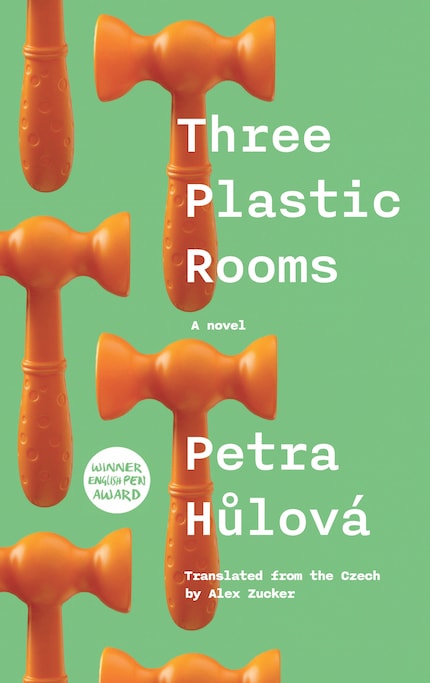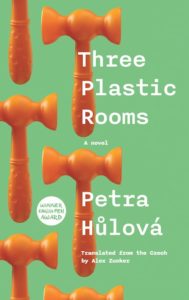
 At a press conference in January 2017, President Putin referred to prostitutes as “girls of lower social responsibility.” Had he read Petra Hůlová’s book under review, available in Czech since 2006 and in German (a language Putin knows well) since 2013, he would have likely taken his words back. Hůlová’s first-person narrative on behalf of a thirty-something female prostitute attempts to establish the image of prostitutes as women of integrity, who actually provide a significant service to society by furnishing their clients with “a bit of humanity” (69).
At a press conference in January 2017, President Putin referred to prostitutes as “girls of lower social responsibility.” Had he read Petra Hůlová’s book under review, available in Czech since 2006 and in German (a language Putin knows well) since 2013, he would have likely taken his words back. Hůlová’s first-person narrative on behalf of a thirty-something female prostitute attempts to establish the image of prostitutes as women of integrity, who actually provide a significant service to society by furnishing their clients with “a bit of humanity” (69).
The prostitute’s clients are mostly men in their forties and older, well-off but suffering from erectile dysfunctions only she can cure, by recourse to a large repertoire of techniques, described in some detail in a very matter-of-fact vernacular. The clients leave the prostitute’s apartment – the three plastic rooms of the title – feeling happy and content, their repressed sexual frustration no longer posing a threat to society’s deeply cherished yet rather shaky stability.
Perhaps unsurprisingly in this line of work, the prostitute is generally non-judgemental about her clients’ peculiar needs that would otherwise be branded perverse. She says: “I realize we all have our quirks, that most of us are born with flaws and the family environment often completes the work of destruction, so people can’t be blamed for being who they are” (108). However, under-age sex is where she draws a line, resorting – physiologically and biologically minded as she inevitably is – to a comparison with hunting regulations: “killing animal young is a crime… and that’s called morality” (127).
She also deserves credit as a consummate professional, for whom a proportionate financial reward for a job well done is no less important than the conscientious acquisition of new skills and the constant expansion of client base: “I still have a few weak points in my game. For instance, I can’t keep up fellatio for an hour and a half, oh well. There’s always something new to learn.… Apart from the money, what keeps me hanging on in this work is the diversity of clients I get to hang on to and the opportunity for continuous professional growth” (164).
Yet, for all her unparalleled frankness (delivered through a non-stop stream of consciousness) and openness (resulting in the book’s frequent references to non-existent but doable television reality shows), Hůlová’s prostitute remains a mystery. The reader does not learn anything about her background, or how and why she joined the profession. It is not quite clear which country she lives in, and even her name is not divulged. Two things are certain, however: first, she is entirely independent and self-sufficient (needing neither a brothel nor a stable sexual relationship nor a pimp); and second, she is not a victim of her clientele, but their saviour.
Needless to say, this is in many ways a departure from the topos of female prostitute, formed in European literature in the past several centuries. According to the American scholar Alexander Zholkovsky, the topos tends to depict prostitutes as unfortunate victims of society and circumstance, deserving salvation but staying beyond it (various idealistic men try to wean prostitutes they like away from the trade – but rarely succeed). Even when such women are given a voice of their own – like in a memorable book by Hůlová’s compatriot Arnošt Lustig, Unloved (1979, English translation 1985), which is the diary of a teenage prostitute in a Nazi ghetto – the classics of the genre have usually been written by men.
Lustig used to claim (I remember him saying this publicly during his visit to the University of Glasgow in the early 2000s) that books about prostitutes guarantee a commercial success to their authors. It is hard to verify this claim. Besides, commercial success may not have been at the back of Hůlová’s mind at all when she embarked on this novel, her fourth (she has published at least five more since). Still, the Czech original of Three Plastic Rooms subsequently received a prestigious Jiří Orten prize and was turned into a play, provocatively entitled Pornography, Czech-Style.
The book may be replete with graphic scenes and foul language (which seem appropriate enough, given its subject matter), but if this is pornography, it is of a politically correct kind, and there are apparently not too many similar texts around. The potential impact of Three Plastic Rooms on the Anglophone audience is greatly assisted by the experienced translator from Czech, Alex Zucker, who excelled himself at converting Hůlová’s highly challenging colloquialisms into English without losing too much in the process.
Reviewed by Andrei Rogatchevski, UiT – the Arctic University of Norway / Institute of Advanced Studies, UCL
Three Plastic Rooms
by Petra Hůlová, translated by Alex Zucker
Publisher: Jantar
Paperback / 200 pages / 2017
ISBN: 9780993377396
To read more book reviews, please click here.
Published on March 1, 2018.




